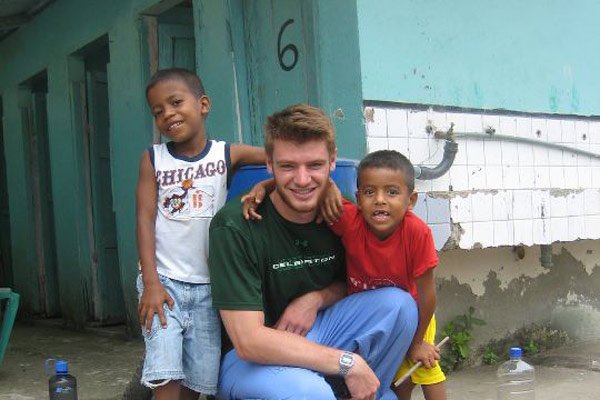Why did you decide to volunteer with UBELONG in Ecuador?
Stephen: This past summer I spent around two months in the Congal Coastal Forest Reserve in Esmeraldas, Ecuador. I learned about UBELONG through my global health professor at my university. As part of my minor's field experience requirement, I had to choose a program for eight weeks which included a health project component. I found these qualities and much more in the program offered in the Coastal Forest Reserve. I admittedly, had my reservations about the being one of the first health volunteers to work through the UBELONG program here, but went with an open-mind and that was all I needed.
Describe your day to day activities as a volunteer.
Stephen: Living and working on the northern coast of Ecuador was a significant lifestyle change compared to my usual summers at home in New Jersey. I shared a small biological reserve station bordering shrimp farms and an estuary with a few volunteers and local workers in the province of Esmeraldas on the Northern Coast of Ecuador. Our work activities were extremely varied from day to day. I assisted three days a week at the local hospital in a few departments including triage, outpatient, emergency services, laboratory, and in the delivery room.
I usually shadowed one or two doctors who were in their last year of residency, which in Ecuador are usually spent in rural settings, or in the lab. I also witnessed three live births in the delivery room. With the two other days left in my week, I worked alongside the other volunteers and local farmers to promote environmentally friendly community practices. We assisted in cocoa harvesting, clearing land with machetes, planting corn, building fences, herding cattle, milking cows, and constructing trash cans.
In addition to these projects, I assisted a Peace Corps volunteer with implementing three sets of sexual education workshops within the community for teenagers in order to discuss the social and physical repercussions of being sexually active.
Overall, my experience in Ecuador was one which I will always remember fondly. In addition to solidifying my passion for volunteerism, it was exciting to explore the many beautifully diverse places within Ecuador and eventually Peru, and my appreciation of Native South American cultures has grown immensely.

How has this experience impacted your future?
Stephen: I was coming from my life at school where everything is so busy and fast-paced. I thought I could make an impact right away. But I learned that making a difference in Ecuador, or anywhere for that matter, takes time. You need to listen and be patient. You need to slow down and work with the local people and can’t just impose on their culture.
First, I learned to be patient. It’s a different place and I needed to let myself adapt. In another country, it was important to remember that cultural norms and pace of life are very dissimilar than back home. I simply had to persevere and not become frustrated if things did not work out as expected.
Second, I learned invaluable skills and information from other people. From my fellow volunteers to the locals, I met so many amazing people with a variety of backgrounds that I never was at a loss for company or discussion. There were a few German and Norwegian volunteers, as well as people from all walks of life at my station including even a college professor from Iowa. I also loved going on trips to explore the surrounding areas/towns and enjoyed meeting local people. I was really curious and intent on speaking with them, and I think that helped make my experience such a good one.
Third, I tried my best to learn Spanish. Even though I only needed the basics to get by, it was worthwhile to be able to speak with the locals in their language so I pushed myself. It was wonderful to be invited by the locals to watch soccer games and go to bonfires with them, and I thought if I could speak better Spanish that I’ll enhance my trip so much more. Practicing was a daily hardship that I eventually became familiar with and as time passed my conversational skills picked up.
Overall, I became much more independent as well as motivated from this trip. I developed more confidence in my decisions and had to adapt to situations in which I had little to no familiarity. I became more of a self-starter in both my health projects and daily life. I enjoyed leading excursions to different parts of the coast on the weekends with volunteers and seized any opportunities to do new work for the reserve. Through this experience, I matured a great deal and developed self-confidence and the ability to step out of my comfort zone and succeed.